
Мы- внуки Победы
We are grandchildren of Victory
Цель урока: Сохранить память о победе в Великой Отечественной Войне (далее ВОВ)
Задачи урока:
Образовательные:
1. ввести и активизировать тематическую лексику по теме «ВОВ»;
3. обобщить грамматический материал по словообразованию.
Развивающие:
1. мотивировать учащихся на дальнейшую работу по теме;
2. развить языковую догадку, мышление, память.
Воспитывающие:
1. сформировать учебно-познавательный интерес к учебному материалу;
2. осознать иностранный язык, как основное средство общения между людьми;
3. воспитать чувство патриотизма, гражданственности и нравственности подрастающего поколения.
Планируемые результаты:
Предметные:
1. освоить лексические единицы по теме «ВОВ»;
2. освоить и отработать основные способы словообразования.
Метапредметные:
Регулятивные:
1. научиться выполнять действия по поиску и выделению необходимой информации в тексте;
2. научиться выполнять действия саморегуляции при самостоятельном выполнении задания на заучивание и самоконтроля при оценивании теста.
Познавательные:
Общеучебные действия:
1. действия по поиску и выделению необходимой информации при чтении текста;
2. действия, связанные с осознанным построением речевого высказывания.
Логические действия:
1. действия моделирования и анализа при выполнении упражнении на словообразование.
Коммуникативные:
1. развить умение планировать учебное сотрудничество, вступая в диалог;
2. излагать свою точку зрения на иностранном языке.
Личностные:
1. осознать роль иностранного языка как основного средства общения;
2. повысить историческую грамотность;
3. показать значимость подвига советского народа в годы ВОВ;
4. развивать свое представление о себе, о родине, о героях.
Ход урока
1. Организационный момент;
2. Этап постановки проблемной ситуации с элементами обучения аудированию;
3. Введение и первичный контроль сформированности грамматического навыка по теме «Словообразование»;
4. Введение и первичная активизация лексического материала по теме «ВОВ»;
5. Обучение поисковому чтению с элементами обучения монологической речи посредством выражения своего мнения;
6. Подведение итогов. Рефлексия.
Ход урока
1. Организационный момент (1 мин)
Т:Hello, boys and girls.
S: Hello, teacher.
T: I’m glad to see you and all our guests.
S: We’re glad to see you too.
T: Sit down, please.
2. Этап постановки проблемной ситуации с элементами
речевой зарядки и обучения аудированию (5 мин)
Знакомство с темой урока. Прежде чем озвучить тему учитель просит учеников посмотреть на книгу (Повесть «Партизанка Лара», Надежда Надеждина) и по ней сказать о своих предположениях по поводу данного урока. Работа в режиме Учитель-Ученики (T-S).
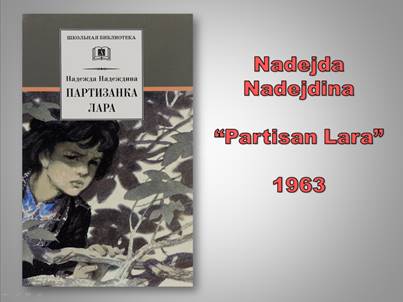 (Слайд 1)
(Слайд 1)
Т: Look! I have a book of the Soviet writer Nadejda Nadejdina “Partisan Lara” I read it when I was the same age as you. It impressed me a lot. Now it will help us name the theme of our lesson. What are we going to talk about in the lesson?
S1: We’re going to talk about partisans.
T: Good. When do we usually talk about partisans?
S2: During the wars.
T: What war are we going to talk about?
S3: The Great Patriotic War (or World War II)
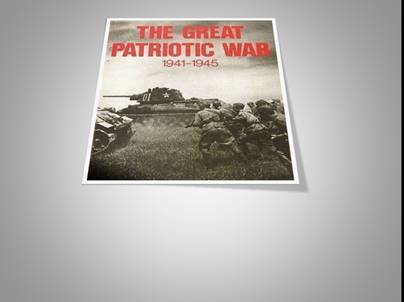 (Слайд 2)
(Слайд 2)
T: Well done. I have many associations with this word. For exemple, June 22nd, 1941; German invasion, front, tragedy.
Do you have any associations?
S1: the Red Army, enemy
S2: victory, May 9th, 1945
T: So, our lesson is devoted to the Great Patriotic War. Since then 75 years have passed. Do we need to remember about this War?
S: Yes, we do.
T: Why? Look through the list of the reasons. Find the most suitable for you. (Appendix 1)
S1: We shouldn’t forget about the national feat.
S2: We cultivate love for the motherland.
S3: We want to live in peace.
T: You’re right. There are many reasons why and you can add to this list. But I think, there is one which is the first and we can use it as the topic of our lesson. What is it?
S: “We are grandchildren of Victory”
 (Слайд 2)
(Слайд 2)
T: That’s right. First of all, we should remember the Great Patriotic War because we’re its grandchildren and great-grandchildren.
T: In the lesson we are going to learn and form new words, remember the heroes’ names, find information in the text and express our opinions.
3. Введение и первичный контроль сформированности грамматического навыка по теме «Словообразование» (12 мин)
Учитель просит заполнить таблицу словами в зависимости от их части речи без их перевода, используя таблицу словообразования Приложения 2. Работа в парах в режиме Ученик-Ученик (S-S)
T: Let’s start with the words and word combinations connected with the Great Patriotic War. Fill the words in the table without translating. Use the suffixes of the nouns, adjectives, Participle I and Participle II in the table below. (Appendix2)
You have 2 minutes. Work in pairs.
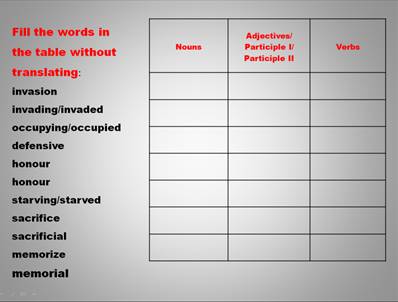 (Слайд 3)
(Слайд 3)
invasion invading/invaded occupying/occupied defensive honour honour starving/starved sacrifice sacrificial memorize memorial
|
Nouns |
Adjectives/ Participle I/Participle II |
Verbs |
|
|
|
|
|
|
|
|
|
|
|
|
|
|
|
|
|
|
|
|
|
|
|
|
|
|
|
|
T: Let’s check.
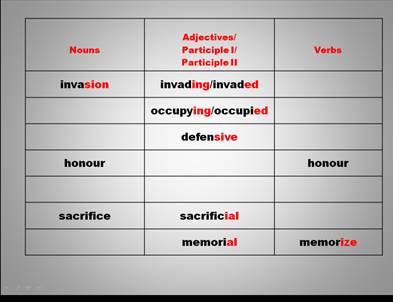 (Слайд 4)
(Слайд 4)
Ученики сверяются с таблицей. Читают существительные, прилагательные, причастия настоящего, прошедшего времени и глаголы. Если есть ошибки, учитель и ученики находят суффиксы в таблицах Приложения 2, свойственные той или иной части речи. Работа в режиме Учитель-Ученики (T-S).
T: Read the nouns, please.
S1: invasion, honour, sacrifice
T: If you have mistakes, look at the table “Word formation”. Find the suffixing and conversion. In suffixing we use noun suffixe –sion (invasion) and in conversion we don’t change the word (honour, sacrifice)
T: Read the adjectives, please.
S2: defensive, honourable, sacrificial, memorial
T: Look at adjective suffixes -al,-able,-ive. Read the PI and PII, please.
S3: invading/invaded, occupying/occupied, starving/starved
T: What are the suffixes for participle I? participle II?
S4:–ing
S5: –ed
T: Read the verbs, please.
S6: honour (conversion), memorize (suffixe –ize)
Учитель просит заполнить таблицу, образовав новые слова, используя правила в Приложении 2. Работа в парах в режиме Ученик-Ученик (S-S).
T: Try to form new words and complete the table. Use the rule in the table below. (Appendix2) I’ll give you 3 minutes. Work in pairs.
T: Let’s check. Read the lines, please.
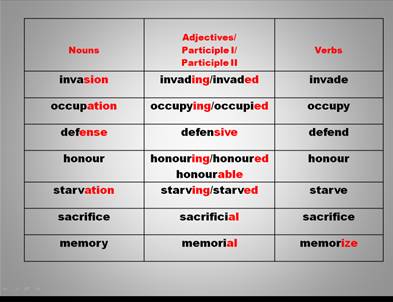 (Слайд 5)
(Слайд 5)
При выявлении ошибок во время контроля учитель объясняет их, указывая на способ образования в Приложении 2.
4. Введение и первичная активизация
лексического материала по теме «ВОВ» (5мин)
Для запоминания новых слов учитель предлагает поработать с карточками в онлайн режиме «Заучивание» на сайте Quizlet.com. Ребята садятся за компьютеры. Работа в индивидуальном режиме.
T: To learn these new words, sit at the computers. Use the web-site Quizlet (https://quizlet.com/_79xn5z) Find “Learning”. You have 3 minutes to learn the words.
T: Let’s do the test. Open “Test”. You have 1 minute.
Система сайта проверяет самостоятельно и выдает результат в процентах, исправляя все ошибки автоматически.
T: Let’s check. You results are good, aren’t they?
S: Yes, they are.
5. Обучение поисковому чтению с элементами обучения монологической речи посредством выражения личного мнения
(5 мин)
Учитель вспоминает о героях войны, выделяя детей, которые не пожалели отдать свои жизни за Родину. Учитель интересуется, знают ли ученики детей-героев войны.
T: We honour the memory of heroes. They were brave men, women and even children. Like adults, children defended our Homeland, sacrificing their own lives. Have you ever heard their names?
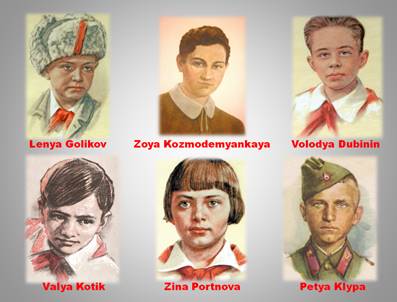 (Слайд 6)
(Слайд 6)
S1: Lenya Golikov
S2: Volodya Dubinin
S3: Zoya Kozmodemyanskaya
Учитель останавливается на одной героине, ставшей прототипом персонажа партизанки Лары в повести Н.Надеждиной и предлагает прочитать текст, чтобы сформировать мнение учеников о том, почему они считают ее героем, используя словосочетания, выражающие личное мнение из Приложения 3.
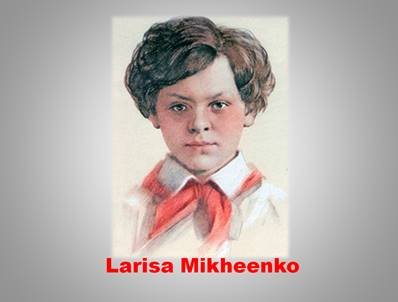 (Слайд 7)
(Слайд 7)
T: The main character of my favourite book is a 12 year-old girl Larisa Mikheenko, a hero posthumously awarded the Order of the Patriotic War (I class).
Let’s read the text about her to answer the question: Why do you think Larisa Mikheenko is a hero? What’s her feat? You have 1 minute to read it quickly.
Use the word combinations expressing your opinion (Appendix 3)
S1: I think Larisa Mikheenko is a hero because she lived alone and her mother and her father died during the Soviet-Finnish war.
S2: In my opinion, she is a hero because her uncle helped fascists and sent his mother and niece Lara to live in the bathhouse.
S3: It seems to me, she is a hero because she didn't leave her grandmother though they were starving.
S4: From my point of view, she is a hero because she took an active part in the "rail war", where she undermined railway tracks, bridges, enemy trains.
S5: As far as I’m concerned, she is a hero because she was only 12 years old.
T: Well done. Nowadays, it’s difficult to imagine how heroic Lara and the other children were.
6. Подведение итогов. Рефлексия (7 мин)
Учитель напоминает о 75 годовщине со дня Победы в ВОВ. Вспоминает с учениками о символах этого праздника. Ученики соотносят слова с картинками, добавляют в предложения.
T: This year we are going to celebrate the 75th anniversary of the Great Patriotic War. Victory Day is a special day in Russia. Do you like this holiday?
S1: Yes, I do.
T: Is Victory Day one of your favourite family holidays?
S2: Yes, it is.
T: Our memory is in its symbols. Do you know its symbols?
S: Eternal fire, Immortal regiment.
T: You are right. Let’s match these symbols to the pictures.
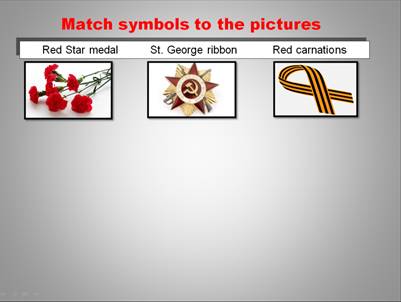 (Слайд 8)
(Слайд 8)
Т: Complete the sentences using these words. Read and translate:
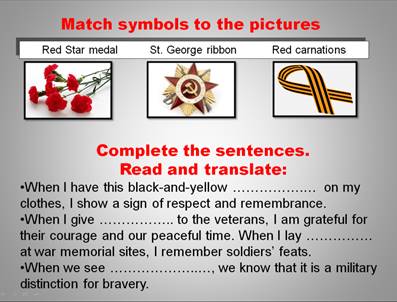 (Слайд
8)
(Слайд
8)
Учитель подводит итоги урока и предлагает ученикам дополнить предложения о том, что они сейчас понимают, что умеют и что хотят.
T: Was our today’s lesson useful for you?
S1: Yes, it was.
T:
At the end of the lesson I suggest you to complete these sentences.
Now I see …
Now I can …
Now I want …
S1: Now I see what is a war.
S2: Now I can form new words.
S3: Now I want to thank veterans and heroes for their courage.
T: As for me,
Now I see you are grandchildren of great Victory.
Now I can be proud of you.
Now I want to thank you for the lesson.
Now stand up. The lesson is over. Goodbye.
Appendix 1
Look through the list of reasons. Find the most suitable for you:
We shouldn’t forget about the national feat.
We should remember that war is starvation and death.
We should know that war is wicked.
We are proud of our ancestors’ Victory.
We are grandchildren of Victory.
We honour the memory of fallen soldiers.
We want to live in peace.
We will tell our children about its heroes.
We learn the courage of brave soldiers.
Appendix 2
Word formation. Словообразование.
Suffixing. Суффиксация
|
Nouns/Существительные |
|
|
-ance, -ation, -sion,: |
o important (важный) - importance (важность) o hesitate (колебаться) - hesitation (сомнение, колебание) o decide (рещать) - decision (решение) |
|
-ery |
o bake (печь) - bakery (булочная) |
|
Adjectives/Прилагательные |
|
|
-ive |
o to act (действовать) — active (активный) |
|
-al |
o continent (континент)— continental (континентальный) |
|
-able (-ible) |
o to eat (есть,кушать) - eatable (съедобный) |
|
Participle I (Причастие I настоящего времени) |
|
|
-ing |
o participate (участвовать) –participating (участвующий) |
|
Participle II (Причастие II прошедшего времени) |
|
|
-ed |
o participate (участвовать) –participated (поучаствовавший) |
|
Verb (Глагол) |
|
|
-ise, -ize: обычно образует глаголы от существительных |
o realize (осуществлять) o patronise (покровительствовать) |
|
Verb (Глагол) > Noun (существительное) |
|
|
to fight (бороться) |
fight (борьба) |
|
to attack (атаковать) |
attack (атака) |
|
Noun (Существительное) > verb (глагол) |
|
|
hope (надежда) |
to hope (надеяться) |
|
trip (путешествие) |
to trip (отправляться в путешествие) |
|
Adjective (Прилагательное) > Noun (существительное) |
|
|
calm (спокойный) |
calm (спокойствие) |
invasion invading/invaded occupying/occupied defensive honour honour starving/starved sacrifice sacrificial memorize memorial
|
Nouns |
Adjectives/ Participle I/Participle II |
Verbs |
|
|
|
|
|
|
|
|
|
|
|
|
|
|
|
|
|
|
|
|
|
|
|
|
|
|
|
|
Appendix 3
Read the text about Larisa Mikheenko to answer the question: “Why do you think Larisa Mikheenko is a hero? What’s her feat?”
Use:
I think …
In my opinion, …
It seems to me, …
From my point of view, …
I guess … (Я предполагаю)
As far as I can see, … (Насколько я знаю)
As far as I’m concerned, …(Насколько я могу судить)
Larisa Mikheenko was born in the Leningrad region, in the village of Lakhta. She lived alone with her mother. Her father died during the Soviet-Finnish war.
In June 1941, Lara and her grandmother went on a summer vacation to her uncle Larion in the village of Pechenevo, the Pustoshkinsky district.
By the end of the summer, the Pustoshkinsky district was under German occupation. The uncle helped fascists. They were betrayed by him. He sent his mother and niece Lara to live in the bathhouse. Lara didn't leave her grandmother. They were starving.
In 1943 Larisa Mikheenko and her friend Raya joined the partisan detachment. She took an active part in the "rail war", where she undermined railway tracks, bridges, enemy trains.
Lara was shot in the village of Pustoshka on November 5, 1943. The Soviet government posthumously awarded the Leningrad pioneer the Order of the Patriotic War (I class) and gave her name to the ship.
Vocabulary:
occupation [ɒkjʊˈpeɪʃn] сущ - оккупация, захват, завоевание
fascist [ˈfæʃɪst] сущ - фашист, нацист
betray [bɪˈtreɪ] гл.- предавать
detachment [dɪˈtæʧmənt] сущ – отряд, дружина
undermine [ʌndəˈmaɪn] гл - подрывать, минировать, разрушать
railway tracks [ˈreɪlweɪ træks] сущ- железнодорожные пути
enemy [ˈenəmɪ] прил - вражеский
shoot [ʃuːt] гл shot, shot
posthumously [ˈpɒstjʊməslɪ] нареч, прил – посмертно,посмертный
Скачано с www.znanio.ru
Материалы на данной страницы взяты из открытых источников либо размещены пользователем в соответствии с договором-офертой сайта. Вы можете сообщить о нарушении.